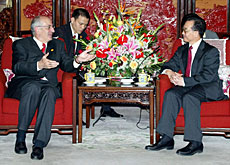China lifts human rights taboo

A senior Swiss diplomat insists China is open to criticism of its human rights record and its treatment of minorities.
Peter Maurer’s comments came on the same day that President Pascal Couchepin was accused of giving the Chinese an easy ride on the same issues during his five-day visit to China.
Maurer met a Chinese delegation for talks in Bern on Monday – the latest in a series of meetings between representatives from both countries.
The two sides discussed the prison system in China, the rights of minorities, religious tolerance, and the death penalty.
According to Maurer, the Chinese delegation examined how Bern applied international standards in all these domains.
The Swiss diplomat told swissinfo that he thought China was now ready to engage in dialogue critical of its human rights record.
“If I compare where we started more than ten years ago, China has substantially changed,” said Maurer.
“It doesn’t mean that human rights violations do no take place in China – they do and we have articulated our concern about these violations.
“But the way the Chinese government today approaches those violations is very different.
“We see that there is a will to address a problem today. Maybe not a capacity to do it immediately, but there is a changed atmosphere in how to discuss human rights violations.”
Human rights
Maurer added that since talks on human rights began, several expert delegations from China had visited Switzerland to look at legal reform processes and how to implement international standards and international practice.
But he conceded that while China had adapted much of its legislation to conform to international standards, especially since joining the World Trade Organization, much more remained to be done.
This was equally true of the notion of free speech, which had gained ground over the years, but had run into problems with the internet, he said.
On the subject of China’s treatment of minorities, such as those in Tibet and Taiwan, the Swiss pointed to the creation of canton Jura in 1979 as a model for a peaceful solution to separatist demands.
“The Chinese themselves made the link with Tibet and Taiwan,” explained Maurer.
“We showed them that one can govern minorities peacefully in a multinational society.”
swissinfo

In compliance with the JTI standards
More: SWI swissinfo.ch certified by the Journalism Trust Initiative









You can find an overview of ongoing debates with our journalists here . Please join us!
If you want to start a conversation about a topic raised in this article or want to report factual errors, email us at english@swissinfo.ch.